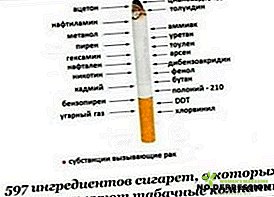Anyone who wants to be healthy should understand that health and tobacco are absolutely incompatible concepts. Cigarette can cause irreparable harm to the body at any age, since tobacco is based on nicotine. The most powerful toxin has the ability to destroy most of the cells in the lungs and bronchi, and then harm the rest of the body's systems.

The idea of the dangers of tobacco should be in all people who want to have a healthy body, because smoking has a detrimental harm leading to addiction. However, even after quitting smoking, one should undergo a course of treatment and prophylaxis in order to completely remove the toxic gums left in the lungs.
What is cigarette smoke
Tobacco addiction is a national problem, and every year more and more young people pick up a cigarette. Men and women of all ages deliberately destroy their bodies, contributing to the development of fatal addiction, which stands on the same level with alcoholism.
Quite often, tobacco smoking can be a fatal disease, since the respiratory organs are severely affected. That is why many people, faced with the consequences of their actions, completely abandon tobacco.
Why does the mere inhalation of cigarette smoke have such fatal consequences for a person? This is because when inhaling smoke about 4,000 different toxic substances enter the body.
- The most dangerous is nicotine, because it, like a drug, causes the body to develop addiction to cigarettes. The substance has a mild stimulating effect, which increases pressure and causes an increase in heart contractions. Turning into smoke when inhaled, nicotine acts on the brain, causing excitement, and then a sharp depletion. That is why antidepressant properties are attributed to cigarettes, because after receiving a new dose, a person's mood rises. Rejection of nicotine, especially in the first two weeks, makes a person very irritable. Insomnia often worries, constant nervous breakdowns occur, but after a while all the symptoms of dependence disappear without a trace.
- Resins in cigarette smoke have a negative effect on the body. It is they who clog the lungs so much that smoking causes death. They penetrate the body with smoke in the form of droplets. When these drops harden, they turn into resins, which tighten the airways and lead to the development of lung cancer.
 Carbon monoxide, or carbon monoxide, leads to a decrease in the body's most beneficial substance - oxygen. A shock dose can lead to oxygen starvation, which will not allow the body to perform all its functions properly. With the gradual atrophy of some organs and increased load on others, problems with blood circulation begin.
Carbon monoxide, or carbon monoxide, leads to a decrease in the body's most beneficial substance - oxygen. A shock dose can lead to oxygen starvation, which will not allow the body to perform all its functions properly. With the gradual atrophy of some organs and increased load on others, problems with blood circulation begin.- Carbon monoxide has a detrimental effect on the walls of blood vessels. All this can lead to problems with the coronary arteries and provoke a heart attack.
- Hydrogen cyanide affects the bronchi, namely the cilia, which are in them and are responsible for the purification of this organ from harmful impurities. Not coping with the cleaning function, the body begins to accumulate in itself the harmful substances that are often the cause of the development of pulmonary diseases.
- As part of tobacco smoke, you can find a small amount of radium, polonium, potassium and thorium - all of these substances are radiation and adversely affect health, increasing the risk of cancer.
Harm of smoking for the human body
The harm of smoking has long been known to everyone. A warning is written on any pack of cigarettes that smoking is harmful to your health, but the person continues to destroy himself.
On the shelves there is a huge variety of brands of tobacco that attract young people to try a cigarette. At the same time, such a person harms not only himself, but also nearby people.
Even with passive smoking, not to mention active, so much harmful substances can accumulate in the body that they can lead to death. Even at the youngest age there is a possibility of death, not to mention the unpleasant consequences such as persistent cough or bronchitis.

It is rather difficult to recover from tobacco dependence, especially with experienced smokers, since it is rather difficult to remove all the tar that has accumulated in the lungs.
If a person is involved in smoking, then it haunts him for many years. Nicotine is a addictive drug, which is why it is very difficult to give it up. When inhaled, it gives a small positive charge, but at the same time saturates the blood with harmful and toxic substances.
Very often due to impaired blood circulation in smokers atherosclerosis and other cardiovascular diseases develop. At the same time, tobacco affects not only the internal organs, but also the appearance of the person. The skin becomes more gray and coarse, sometimes it acquires a yellowish tint, turns pale.
The skin gradually becomes dry and loses its elasticity. She becomes very sensitive to light, there are circles under the eyes. Wrinkles due to the destruction of collagen appear much earlier than usual. In general, smokers look 10 years older than their age.
Another external manifestation of smoking is yellow teeth. A yellow patina appears due to harmful elements in cigarette smoke. Gradually the destruction of enamel occurs, caries appears. Nails and hair lose shine and grow much slower.
In men, tobacco can cause an early loss of potency in middle age, especially with experienced smokers. Infertility may occur in women. For adolescents, smoking can additionally lead to a decrease in mental ability.
In general, smoking can lead to the development of the following diseases, each of which becomes progressively chronic and can have various effects, such as:
- pneumonia;
- Chronical bronchitis;
- pulmonary enphisema;
- atherosclerosis;
- malignant lung tumors;
- myocardial infarction.
The most dangerous consequence of smoking cigarettes is cancer. Prolonged exposure to nicotine causes cells to mutate, forming tumors. If there is an additional genetic predisposition to cancer, then smoking can be the lever that will trigger the development of the disease.
Organs most affected by nicotine
The high content of toxic and harmful substances adversely affects all organs, but some are most at risk:
- Respiratory organs receive the first blow, as tobacco smoke destroys mucous larynx and vocal cords. All taste buds spoil, voice gradually sits down. Weakening of the lungs leads to the appearance of cancer or other lung diseases, and the risk of developing tuberculosis increases.
- Nicotine, by stimulating the brain, affects the nervous system, causing dizziness and headaches. The pressure inside the skull rises, which increases the risk of stroke. Any smoker becomes nervous and irritable. Also memory deteriorates.
- The cardiovascular system wears out much faster, atherosclerosis gradually appears. Due to the fact that nicotine destroys vitamin C, cholesterol begins to rise, hypertension and ischemia develop.
- The digestive organs suffer from the entry of toxic substances from cigarette smoke into the stomach, which cause an increase in the acidity of the juice, which provokes an ulcer and cancer of the stomach.
- Female smoking leads to abnormalities in the genital organs, reduced sexual desire and the risk of miscarriage with infertility. Smoking during pregnancy can harm the baby in the womb.
Acute nicotine intoxication
Nicotine poisoning can occur not only with prolonged consumption of cigarettes, but also with one-time smoking. Acute intoxication most often occurs in non-smoking people, because their bodies are not accustomed to combating poisonous substances. As a rule, the symptoms, despite their soreness, are fairly harmless, but the headache and general inhibition of the body are present for several days.
 In acute poisoning, inhibition and arousal alternate, therefore, when the first signs appear, first aid is necessary.
In acute poisoning, inhibition and arousal alternate, therefore, when the first signs appear, first aid is necessary.
- You need to saturate the body with fresh air, so you need to open a window or go outside.
- Wash the stomach with a light solution of salt or plain boiled water and drink the enterosorbent (Smektu, activated carbon).
- Drink plenty of sweet black tea, milk, plain water, or rosehip tea.
- Go to bed on your side, because there is a chance of vomiting.
If there are signs that may lead to death in acute poisoning, you should call an ambulance.
Passive smoking
Tobacco smoke affects not only the smoker, but also the people around him, especially those who are in contact with avid tobacco lovers.
They may have the same diseases as those who consume cigarettes. Passive smokers increase the number of heartbeats, coughs, and even suffocation attacks.
Pregnant women are at risk of miscarriage. There is a decrease in performance, a person may become depressed. The skin color and hair condition deteriorates.
The more a person smokes, the more he damages the body, the greater becomes the risk of developing serious diseases. That is why it is important to give up smoking if you want to have a healthy body.


 Carbon monoxide, or carbon monoxide, leads to a decrease in the body's most beneficial substance - oxygen. A shock dose can lead to oxygen starvation, which will not allow the body to perform all its functions properly. With the gradual atrophy of some organs and increased load on others, problems with blood circulation begin.
Carbon monoxide, or carbon monoxide, leads to a decrease in the body's most beneficial substance - oxygen. A shock dose can lead to oxygen starvation, which will not allow the body to perform all its functions properly. With the gradual atrophy of some organs and increased load on others, problems with blood circulation begin.









